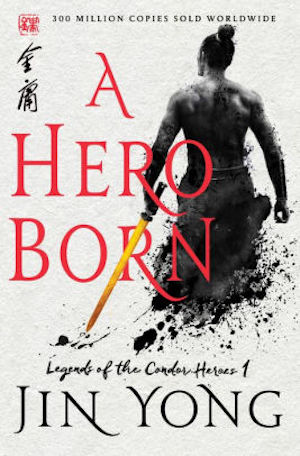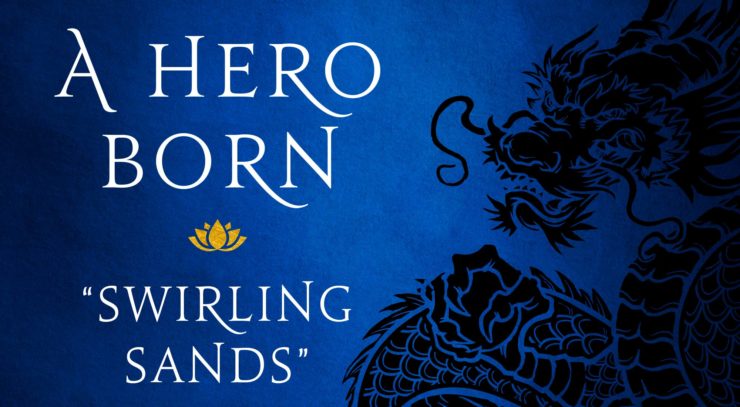Jin Yong’s A Hero Born is a fantastical generational saga and kung fu epic, filled with an extraordinary cast of characters. This Chinese classic—coming to the U.S. for the first time on September 17th as translated by Anna Holmwood for St. Martin’s Press—is a tale of fantasy and wonder, love and passion, treachery and war, betrayal and brotherhood.
Want to start reading now? Tor.com is serializing selections from A Hero Born—you can find all the previous chapters here! And check back every morning this week for another installment of the third episode: “Swirling Sands”.
CHAPTER TWO
“Swirling Sands”
3
Years passed. Lily Li named the boy Guo Jing as Qiu Chuji had suggested. He was a slow developer, speaking his first words only at the age of four, but he was strong and able to herd cattle and sheep all by himself. Mother and son depended on each other for survival, living a simple yet backbreaking existence. They learned Mongolian, but when together, still spoke in the Lin’an dialect of Chinese. The boy’s soft voice saddened his mother. “You should also be able to speak your father’s Shandong tongue, but I never learned it in the short time we had together,” she would say.
It was October, the air was growing colder. Guo Jing, now six years old, rode each day out to pasture, accompanied by his sheepdog. Just as the sun was at its highest, a large black bird appeared in the sky. It hovered above the herd briefly, then swooped. One of the young sheep broke free and ran.
Guo Jing jumped onto his pony and galloped seven or eight li before at last catching it. Just as he was about to turn back with the sheep, a deep rumble came echoing across the steppe. Was it thunder? He was not sure what it was, but it frightened him. It grew louder, until a horse’s neigh rose above it, followed by more horses and men shouting.
He had never heard anything like it. He hurried the sheep up a small hill and into a nearby clump of bushes. Safely hidden, he ventured a glimpse out.
Through the plumes of dust an army was racing toward him. Guo Jing watched as the commanding general barked an order, and the army broke into two and within seconds assumed formation. They wore splendid white turbans, into which they had stuck colored feathers.
A brief silence, then a blast of horns from the left. Another army. Three rows charged forward. The young man leading them, an elongated figure in a red cape, held his sword high. The two armies clashed and a bloody battle commenced. The advancing army had fewer men and were beaten back before long, but support was quick to arrive and the fighting grew ever more fierce. And just as the battle appeared to be waning, a blast of horns came again from the east, shaking the remaining men into new life.
“The Great Khan Temujin has arrived! The Great Khan has arrived!”
The fighting continued, but now the soldiers kept looking over in the direction of the horns.
Guo Jing followed their gazes eastward. A cloud of sand swelled, until through it broke a group of riders, holding high a pole from which hung white hair. Their cheers grew louder, bolstering the riders’ allies and scattering the hitherto tight formations of their foe. Guo Jing watched from deeper under cover as the banner approached the very hill upon which he was standing.
A tall, middle-aged man was prominent among the riders. He wore a helmet made of shiny metal and his chin laid growth to a brown tuft of beard. Guo Jing did not know this was the leader of the Mongolians, the Great Khan Temujin, later to be known throughout history as the mighty Genghis Khan; he did not even know what the word “khan” meant. But he understood the man’s power, and it frightened him.
Temujin and a few of his men sat astride their horses, watching the battle below. Presently they were joined by the young man dressed in the red cape, who called to the Khan.
“Father, we are outnumbered. Should we retreat?”
“Yes, take your men to the east.”
Buy the Book


A Hero Born
He turned back to the battlefield. “Muqali, accompany the Second Prince and his men back to the west. Bogurchi, you and Tchila’un go north. Kublai, you and Subotai, south. When my banner is raised and the bugle sounds, turn back and attack.”
The men rode down the hill and within moments the Mongolian army was on the retreat.
“Capture Temujin, capture Temujin!” The enemy forces, meanwhile, were trying to fight their way up the hill.
Temujin stood firm at the top, protected from coming arrows by a wall of shields. Three thousand men, led by Temujin’s brother-in-arms Kutuku and his bravest general Jelme, were mounting a valiant defense at the foot of the hill.
The ground shook with the clash of swords and roar of battle. Guo Jing watched, now just as excited as he was frightened.
The fighting continued for an hour or so, as thousands of enemy soldiers mounted charge after charge. Temujin’s elite guard lost some four hundred men, but killed at least ten thousand. And yet arrow-fire remained intense. Combat was especially savage on the northeastern side, where the Khan’s ranks looked as if they might collapse at any moment.
“Father, isn’t it time to raise the banner?” Ogedai, Temujin’s third son, implored.
Temujin’s eyes were sharply focused like an eagle’s, never moving from the battlefield. “But their men are not yet spent,” he answered gruffly.
The enemy soldiers mounted a renewed attack on the northeastern side under the command of three of their best generals, each with his own black banner. The Mongol forces were steadily losing ground. Jelme came riding up the hill.
“Khan, our men can’t hold on much longer!”
“Can’t hold on? Call yourself a man fit to lead men?”
Jelme’s cheeks flushed. He grabbed a sword from one of Temujin’s guard, turned and howled as he charged forward, hacking a bloody path through the enemy, right up to the black banners. The generals pulled back hard. Jelme stabbed all three bannermen in quick succession, then threw down his weapon, grabbed the flags and returned to Temujin, planting them upside down at the Khan’s feet.
Fighting continued. An enemy commander dressed in black appeared from the southwest. Within seconds, he had shot a quiver’s worth of arrows, each taking one Mongol soldier. Two Mongol commanders charged at him with their spears. Both commanders were shot from their horses.
“Lovely!” Temujin said, just as an arrow lodged in his neck. Another followed close behind, heading straight for his stomach.
Temujin reared his horse. The arrow sank deep into the steed’s chest, so only the feathers remained visible. The horse fell to the ground. Temujin’s men watched in shock. The enemy were pouring up the hill, howling as loudly as their lungs would allow. Ogedai pulled the arrow from his father’s neck, tore the shirt from his back and began bandaging the wound.
“Don’t worry about me, son,” Temujin said. “Defend the pass!”
Ogedai turned and shot down two enemy soldiers.
Kutuku had been leading an attack from the west, but his men were forced to retreat after using up all of their arrows.
“Kutuku,” Jelme said, his eyes red. “You run like a scared rabbit?”
“Run?” Kutuku replied. “We have no more arrows.”
Temujin threw Kutuku a handful of arrows from where he lay in the mud. Kutuku loaded his bow and shot the closest general, then ran down the hill and retrieved his horse.
“Excellent, my brother!” Temujin said as Kutuku returned.
“Why not raise the banner and sound the horns?” Kutuku suggested, his cheeks smeared with blood.
Temujin pressed against the wound in his neck. Blood pulsed through his fingers and down his wrist. “Not yet. The enemy still have life left in them.”
“We are not afraid to die here on the field,” Kutuku said, dropping to his knees, “but the Khan is in grave danger.”
Temujin took the reins and struggled up onto the saddle. “We must defend the pass!” he said as he spurred his horse. Raising his saber, he sliced through three enemy soldiers charging up the hill toward them.
Temujin’s reappearance took the enemy by surprise. Now was the time.
“Raise the banners! Sound the horns!”
A howl went up. One of the guardsmen stood on his horse and raised the white horsehair banner. The horns sounded. The deafening blast was instantly drowned out by the roar of battle, as line after line of soldiers thundered forward.
The enemy outnumbered the Mongols, but they were now facing an attack from all sides. The outer forces broke within moments, and the fighting engulfed the central guard. The general in black was barking orders, but morale was crumbling.
It took the Mongol army less than an hour to obliterate their opponents. Those left alive fled, including the general in black, who galloped off toward the horizon.
“Three jin of gold to whoever catches him!” Temujin called.
A dozen of Temujin’s best men sped after the fleeing general.
The general turned and fired back at his pursuers, knocking man after man from his horse, until they dropped back and let him go.
Temujin’s men had claimed a resolute victory over their longstanding enemy, the Tayichi’ud. Temujin was flooded with memories of his capture at their hands, their beatings and insults, the torture and the yoke. Today’s victory had gone some way to redressing that humiliation. His heart quickened, and a laugh bubbled up from within. The earth shook with the shouts of his men as they withdrew from the bloody field.
Part 4 of “Swirling Sands” arrives on September 12th!
Excerpted from A Hero Born, copyright © 2019 by Jin Yong.










